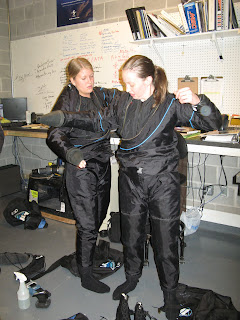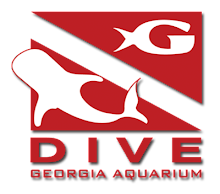Elliott Jessup and volunteer Scientific Divers in Training, Tom McNamara and Charles Evick, joined the EPA (Environmental Protection Agency) along with Georgia Institute of Technology for a week of coral research aboard the 224’ OSV Bold, this time out of Key West. The purpose of this trip was to investigate a potentially invasive species of coral, Tubastraea coccinea.
Tuesday, December 22, 2009
Tubastraea Research Trip
Elliott Jessup and volunteer Scientific Divers in Training, Tom McNamara and Charles Evick, joined the EPA (Environmental Protection Agency) along with Georgia Institute of Technology for a week of coral research aboard the 224’ OSV Bold, this time out of Key West. The purpose of this trip was to investigate a potentially invasive species of coral, Tubastraea coccinea.
Friday, November 27, 2009
Surface Supply Training
 Recently, surface supply training classes were held for volunteers and staff, as surface supply is used in most of the tanks. The advantage to surface supply is the absence of a large tank which would hinder movement in exhibits and small areas where work may be necessary. Each class lasted two days, consisting of both classroom work along with actual surface supply diving to practice the skills taught.
Recently, surface supply training classes were held for volunteers and staff, as surface supply is used in most of the tanks. The advantage to surface supply is the absence of a large tank which would hinder movement in exhibits and small areas where work may be necessary. Each class lasted two days, consisting of both classroom work along with actual surface supply diving to practice the skills taught.Friday, November 20, 2009
Construction Clean-Up
Tuesday, November 3, 2009
Scaffolding for Beluga Tank
Sunday, October 25, 2009
Rescue Diver Training
Friday, October 23, 2009
Cave Diving
 In the interest of maintaining our diving proficiency and technical capabilities, we went to Florida to dive their underwater cave system. Cave diving is one of the most challenging fields of diving.
In the interest of maintaining our diving proficiency and technical capabilities, we went to Florida to dive their underwater cave system. Cave diving is one of the most challenging fields of diving.View Our Pictures
Wednesday, October 7, 2009
Dr. Richard Pyle
Dr. Richard Pyle: Back to the Future in Underwater Exploration: An Old Technology Comes of Age
 Dr. Pyle came to the Georgia Aquarium to speak with us about a new rebreather he and Poseidon are developing. Currently, rebreathers are primarily used by technical divers. However, the rebreather that Dr. Pyle presented was created for recreational diving as it is "user friendly". In other words, non-technical divers with less expertise of rebreathers can use the same technology that technical divers have been using in the past.
Dr. Pyle came to the Georgia Aquarium to speak with us about a new rebreather he and Poseidon are developing. Currently, rebreathers are primarily used by technical divers. However, the rebreather that Dr. Pyle presented was created for recreational diving as it is "user friendly". In other words, non-technical divers with less expertise of rebreathers can use the same technology that technical divers have been using in the past.
 Dr. Pyle came to the Georgia Aquarium to speak with us about a new rebreather he and Poseidon are developing. Currently, rebreathers are primarily used by technical divers. However, the rebreather that Dr. Pyle presented was created for recreational diving as it is "user friendly". In other words, non-technical divers with less expertise of rebreathers can use the same technology that technical divers have been using in the past.
Dr. Pyle came to the Georgia Aquarium to speak with us about a new rebreather he and Poseidon are developing. Currently, rebreathers are primarily used by technical divers. However, the rebreather that Dr. Pyle presented was created for recreational diving as it is "user friendly". In other words, non-technical divers with less expertise of rebreathers can use the same technology that technical divers have been using in the past. Monday, October 5, 2009
Carbon Removal
Thursday, October 1, 2009
Drysuit Course
 Part of dive operations is training our staff and volunteer divers. We conducted a drysuit course over a 3 day period that was both interesting and entertaining. Adding a drysuit to one's list of equipment can be taskloading, especially without the proper training. There are now two bodies of air to control, not to mention keeping the air out of one's feet so a blow up doesn't occur. Our last day of class was a dive in Lake Lanier that went very well, aside from the vis being so low. Overall this was a very successful course.
Part of dive operations is training our staff and volunteer divers. We conducted a drysuit course over a 3 day period that was both interesting and entertaining. Adding a drysuit to one's list of equipment can be taskloading, especially without the proper training. There are now two bodies of air to control, not to mention keeping the air out of one's feet so a blow up doesn't occur. Our last day of class was a dive in Lake Lanier that went very well, aside from the vis being so low. Overall this was a very successful course.Tuesday, September 29, 2009
Freedive Course
Tuesday, September 22, 2009
Lionfish Invasion
Tuesday, September 1, 2009
Subscribe to:
Comments (Atom)






